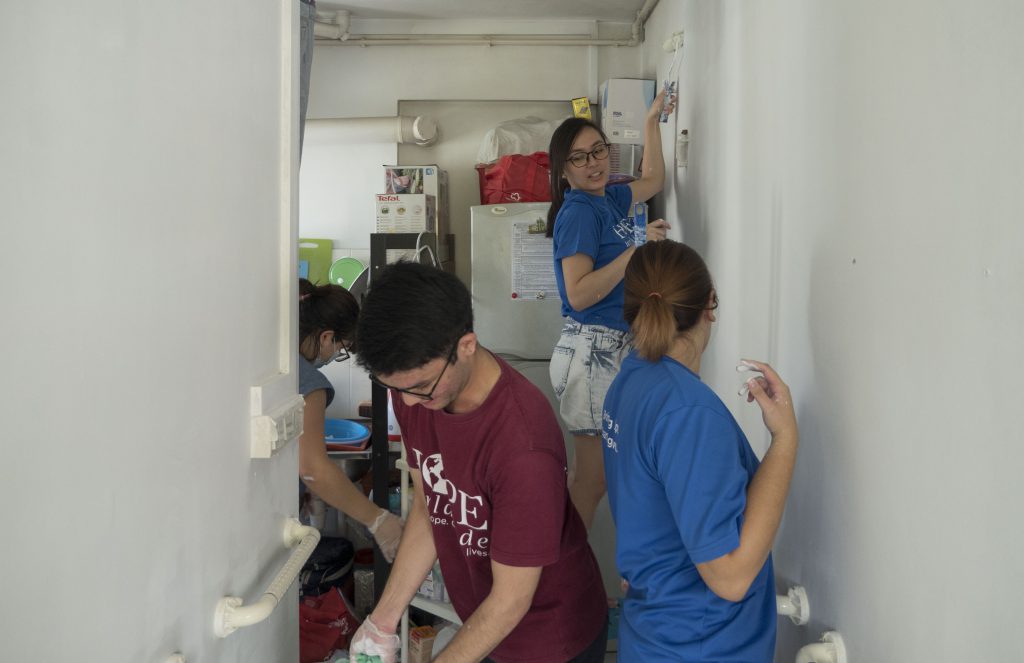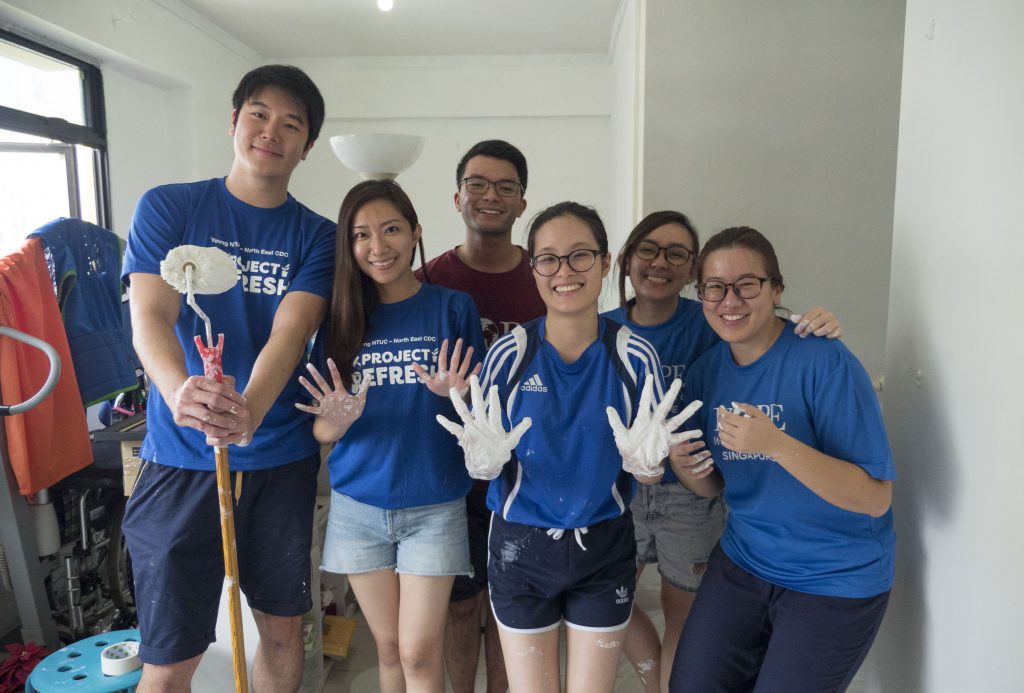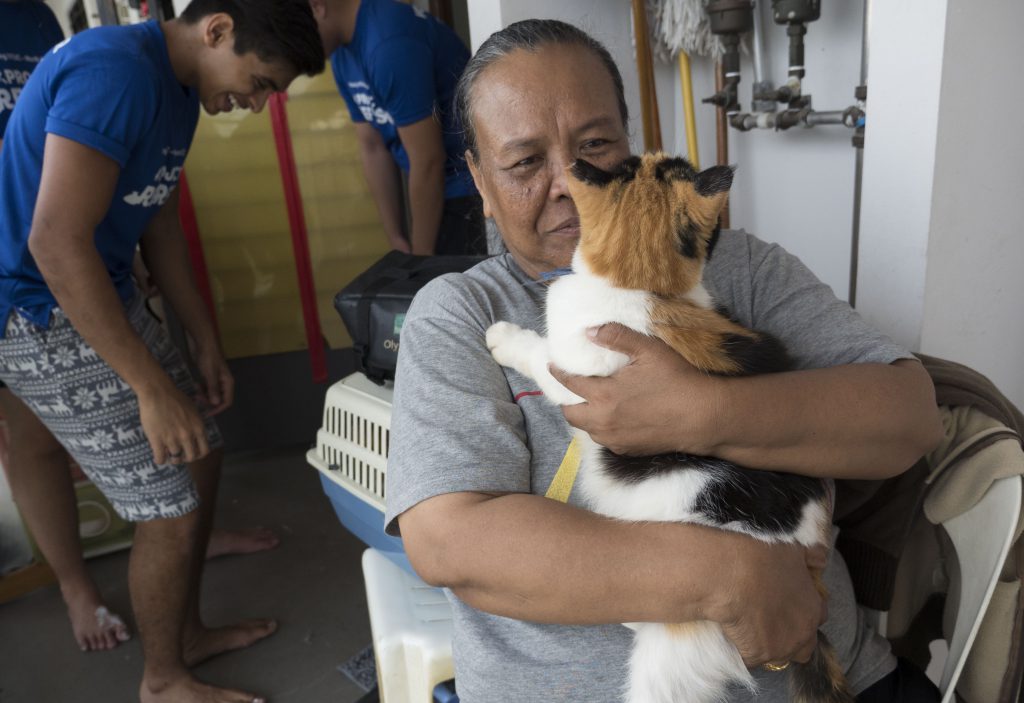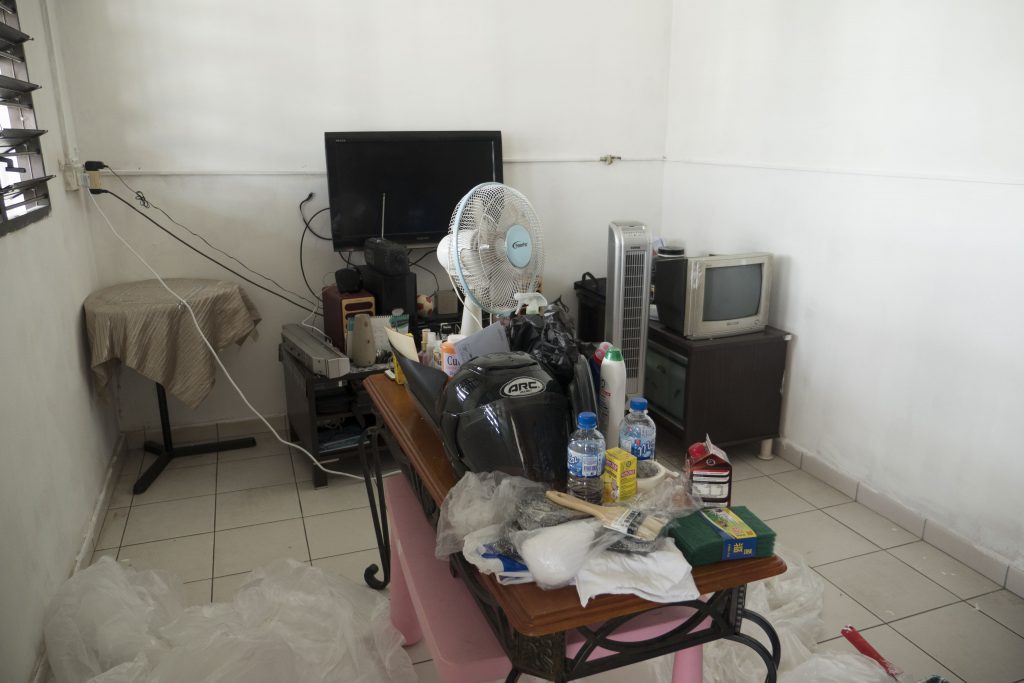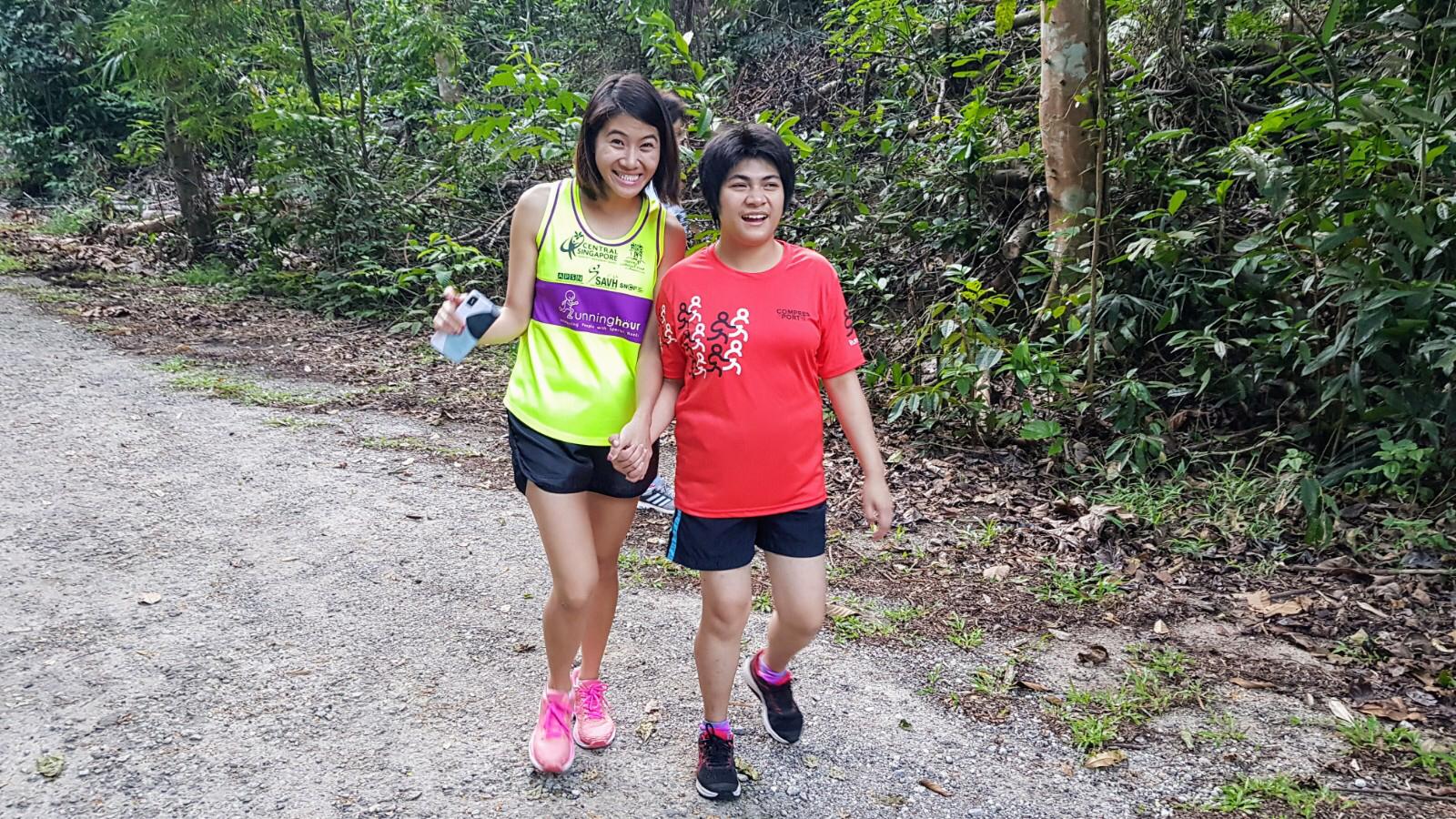Kiasu, competitive, impatient, and grouchy. These are traits that are often associated with being a Singaporean.
Despite this negative perception of our society, I truly believe that Singaporeans are highly compassionate people. We have had multiple awards celebrating the good that Singaporeans have done, and we have heard so many stories of the people who have dedicated their time and energy into building cities of good, where we give our best for others.
Just last year alone, people in Singapore had donated about S$30 million to one-stop giving online platform, Giving.sg, with $12.2 million raised during the Giving Week season. This is just one of the many examples of how Singaporeans are actually altruistic at heart. We just tend to be too self-critical to realise it, and it’s not in us to accept credit for being model citizens.
For some of us, it may even come as a surprise to know that Singapore is one of the top 10 most generous countries in the world. This is because on the surface, it seems like a lot of us barely do anything to give back to our society.
ARE SINGAPOREANS ALTRUISTIC?
We’ve all had the mandatory CIP modules in school. Many of us have also gone on field trips or did personal projects where we headed out and interacted with the beneficiaries. We’ve experienced the sense of fulfillment and contentment from being able to make a difference in someone else’s life, especially someone less well-off than we are.
The same sense of gratification from giving is something that so many in our millennial generation seek for in life—meaning. The majority of us have an innate desire to give or contribute to making our society better.
According to the Individual Giving Study (IGS) 2018 by the National Volunteer and Philanthropy Centre (NVPC) on individual giving habits and motivations of people in Singapore, they found that most people in Singapore have the intention to volunteer or donate in the future.
In fact, 9/10 people in Singapore have the intention to donate in the future and 7/10 have the intention to volunteer in the future.
Image Credit: GivingWeekSG, Giving Week 2018
Through the course of creating content for our (MOSG) platform, I am often surprised by the amount of public-spirited reactions on our posts.
When we ran a feature of Rahman, a migrant worker who suffered severe burns, we were so heartened by the number of people who left comments on their wish to help him. Private messages also came in enquiring on ways in which they could extend various forms of help to the individuals we’ve featured.
BUT DO WE GIVE ENOUGH?
Despite our altruistic views towards giving however, many of us still feel that we are not doing enough to help the society, and we often feel bad about it.
In an article Vulcan Post wrote about five millennials’ track record in volunteering, almost all of them revealed that they are not proud of how little they volunteer in recent years. The reasons for that largely revolve around one issue, which is the lack of time.
Singaporeans are inherently pragmatic. As an independent adult, there are so many commitments in our life to worry about. When you only have 24 hours to make a living, spend time with family and friends, and to pursue any other personal projects or hobbies, you are forced to prioritise. And chances are, the priority will be for self before strangers.
Furthermore, we associate giving with having to plan and to put in hours into volunteering at an event or with an organisation. This will seem like a big commitment amidst our perpetually filled schedules and more often than not, we put it off simply because it seems like too much work. It doesn’t help that most of us find it intimidating or are too paiseh to volunteer alone.
The other kind of giving we usually think of is monetary donations.
In the same IGS study, Director of Knowledge, Marketing & Advocacy with NVPC, Mr Jeffrey Tan shared that financial security is among the top three life priorities for Singaporeans, so “in times of perceived economic uncertainty, more Singaporeans may hold back on cash giving.”
However, while there is that, and there is still a stigma against donating money for fear of it being exploited by fundraisers, we have also seen so much generosity from Singaporeans on the many fundraising campaigns on platforms like Giving.sg.
FEAR OF GETTING TOO EMOTIONALLY-INVESTED
A friend of mine told me about how she used to actively volunteer at an elderly home. She eventually stopped volunteering due to the emotional toll of having to witness the sufferings of the beneficiaries, and the painful realisation that there were a lot more that needed to be done for them, but there just weren’t enough resources.
Image Credit: GivingWeekSG, Giving Week 2018
There’s also the question of whether one’s action does any good for the beneficiaries. In fact, besides the aforementioned reasons, the 2018 study found that 25% of former volunteers stopped volunteering because they found that the activity they engaged in created little impact or meaning.
The desire to make a difference is something that is growing on many Singaporeans. As mentioned above, we are constantly seeking meaning in what we do, and it can be very difficult for us to engage in something if it doesn’t seem to be making a notable difference.
THERE ARE MANY WAYS TO GIVE
With all that said, the spirit of giving certainly isn’t lost on Singaporeans. We just need to be more conscious of how we can give.
Giving really shouldn’t be something that is difficult as it is merely something that comes from one’s heart. It can be as simple as giving up our seat on the MRT or returning our food trays at hawker centres. These spontaneous acts may seem insignificant as we are already so used to doing this in our daily lives, but I take heart in knowing that these are micro-giving behaviours that make a difference and sets the foundation for a giving heart. This is in fact, the ethos of Giving Week’s belief: where little acts, multiplied by millions, can make a world of difference.
There are also plenty of other avenues in which we can contribute to charitable causes, especially during Giving Week 2019. For example, there are many events that are held in conjunction with non-profit organisations, and companies that have corporate social responsibility programmes, and supporting these events or companies are also ways to help.
DISCOVER GOOD AT GIVING WEEK 2019!
From 1 - 7 Dec, be part of the Giving Week movement and join us at The Good Hubs and The Good Life as we celebrate the spirit of giving. Show your support by checking out the carnivals and flea markets held by various organisations at The Good Hubs here!
Businesses across Singapore will also be running special promotions and campaigns under The Good Life! Shop, dine, and live for good when you support the businesses here.
Every bit counts when it comes to doing good, so head on over to givingweek.sg for more information on the events and how you can share your time, talent, and voice to the people who need it. Together, let’s build a City of Good!
(This article was written in collaboration with the National Volunteer & Philanthropy Centre, organiser of Giving Week.)
(Header Image Credit: GivingWeekSG)
Once, she served a case where violence was prevalent at home, and where the child bore the brunt of the violence. Despite the family having already gotten official protections under relevant laws in Singapore, the mother had continued to keep her husband around by choice, and out of fear that things would escalate if otherwise.
As a social worker on the case, she knew that the violence will continue to harm the mother and child under such an arrangement but there was only so much she could do as a third party. She almost had to close the case knowing that the abuse will continue.
This is just one of many cases that has haunted social worker, Gina, emotionally, because it is in her nature (and job) to help and she wasn't able to help them.
“I’d go home and think about it a lot, and it’ll bring me to tears.”
Sadly, this is part of the reality, she tells me. Ultimately, social workers like Gina can only do their best to process situations together with their clients and advise them in the hope that they will find it within themselves to make changes. She is in no position to force or impose anything on her clients, because it is their life to live after all.
“I had to really learn how to let go.”
Social Work Pushes A Person’s Emotional Capacity
Emotional exhaustion is an almost everyday challenge for social workers. For new social workers in the field especially, it is very easy to be overwhelmed, Gina explained.
“We don’t really know how to draw the line between work and personal life. But with time and experience you will have to learn self-care.”
Many times, Gina had returned home from a day at work, only to cry to herself thinking about her clients' situation and how heartbroken she is for them. It is worse when she thought that she had done her best and in whatever she could, only to see no progress.
“You feel very helpless. It’ll definitely affect you because these are lives we’re talking about. These are families that are presented in front of you.”
Having to deal with such emotions is twice as hard for Gina, because the self-professed empath takes on whatever the clients feel. In fact, she had to rule out her initial dream of being a nurse for she would find herself unable to function when she sees people in physical pain.
“Literally, when I see people being in pain, I take on that pain myself.”
A Calling In The Helping Profession
Social work came into the picture in Gina’s secondary school years. After gaining insights into what it encompasses from a friend from church who was a social worker, she realised that she, too, could do it. It was a perfect match for what she had been longing for, and it fit her personality well.
Several informal volunteer stints later, her mind (and heart) was set. The desire to do social work stuck with her all the way till when she was applying for university after JC.
“I realised that I really enjoyed the process of being in someone’s life for a moment, or to hear a story of someone and to assist them, or just to support them in some way.”
However, doubts naturally started to arise when she started getting comments that discouraged her from taking on what is seemingly a vocation with ‘no future’. And one of the biggest obstacles for her was getting approval from her parents to study social work in university.
“Initially, my dad was not very for it. I think he felt that, and a lot of people have this misconception that social work is like volunteering, and you don't get paid for this. So he thinks there’s no career progression [as well].”
There were also demoralising remarks from friends:
“Do you even need to study social work? Can't everyone do it?”
Thankfully, Gina managed to secure a scholarship, which paved the way for acceptance from her parents, as it symbolised to them the recognition of social work in the industry today.
In her course of study, she explained that students were taught about human development, and in short, the sciences behind human behaviour and how that knowledge helps them in knowing how to work with different groups of people. As part of the course, Gina has also had to complete 800 hours of internship.
Image Credit: Gina
However, even with all the counseling and coursework training, being out in the real world is another ball game altogether.
In an overseas social work opportunity, she has had to work with sex workers, of which many of them were tricked into working at the brothel. Not exactly trained in trauma work, she shared that while she managed to impart certain developmental skills to the ladies there, it was more an experience that humbled her greatly.
“It made me realise how fortunate I am. It made me realise how the world is so much bigger than myself.”
Many of us think it’s the end of the world when we face certain setbacks in our life, but comparing it to the ladies, Gina explains that it makes “you realise [that] it’s not such a great deal.”
We could be worrying about messing up a deadline at work, but many of the sex workers there come from poor or broken families who have been lured into the trade, and find themselves trapped.
Being A Social Worker Also Means Having 'Fight' Conventions
Besides her stint overseas, Gina have also, at times, had to go against society’s conventions.
Once, she had to convince a school (and herself) that it is the right thing to pull a student out before he completed his secondary school education.
The student was sent to the youth centre that she worked at, as part of a mandated six months programme for a crime he had committed. Gina later realised, and with most of the youth, that this youth was just misunderstood.
It’s common for teenagers to talk about wanting to quit school and although it was the same for the youth, he had also expressed interest in a vocation: making coffee.
“So it wasn't just because he just want to be lazy and not do anything. He just felt that academics really wasn't a fit for him.”
After processing his case and getting support from the parents to allow his son to drop out of school in return that he be sent for the barista training course, Gina sought support from the school. However, that was the biggest obstacle, and the principal even emailed her to question her intentions. It was, to any layman, a ridiculous request to allow a student to drop out of secondary school.
“For a while I questioned everything I did. Whether I’m ruining this child’s life. But my supervisor was very encouraging and after looking through my assessments again we decided it was for the best of the child.”
There was very bad blood between the school and the agency she worked at after the case but eventually, the youth went on to graduate from the barista training program, worked at a cafe, and was promoted to manager.
Image Credit: Gina
Gina added that when she went back to visit him one day, the youth had told her that “all his life, he felt that he couldn't do anything right, or that people kept telling him that he wasn't good enough, and now he finally feels like he’s actually good at something and is recognised for it.”
Besides her official work delegations, Gina has also continued to volunteer with various groups like Runninghour, an inclusive running club that promotes the integration of Persons With Special Needs (PWSN) through running
As somebody who loves sports and the outdoors, Runninghour offered a unique opportunity for her to combine her two passions – fitness and working with people in need. Running guides like herself take time off their busy schedules to run with PWSN who might be mildly-intellectually challenged, physically challenged, hearing challenged or visually challenged.
And for Gina, who has been actively volunteering with Runninghour for six years, it brings her back to why she even went into social work in the first place: To make an impact in some way.
“It doesn’t need to be significant. It can be as simple as assuring someone that they are special, valued, or loved. I guess my ultimate goal is to at least show a bit of love to people through my actions or words.”
---
As part of Runninghour, Gina will also be assisting in their upcoming Run for Inclusion 2019, Singapore's only mass running event where participants run alongside hearing, intellectually, physically and visually-challenged runners. If you're keen to contribute or be part of the community, head over here for more information.
This is not a sponsored post.
Also read: Dealing With Cancer By Running, And Being Called ‘Chao Keng’ For It.
(Header Image Credit: Gina)
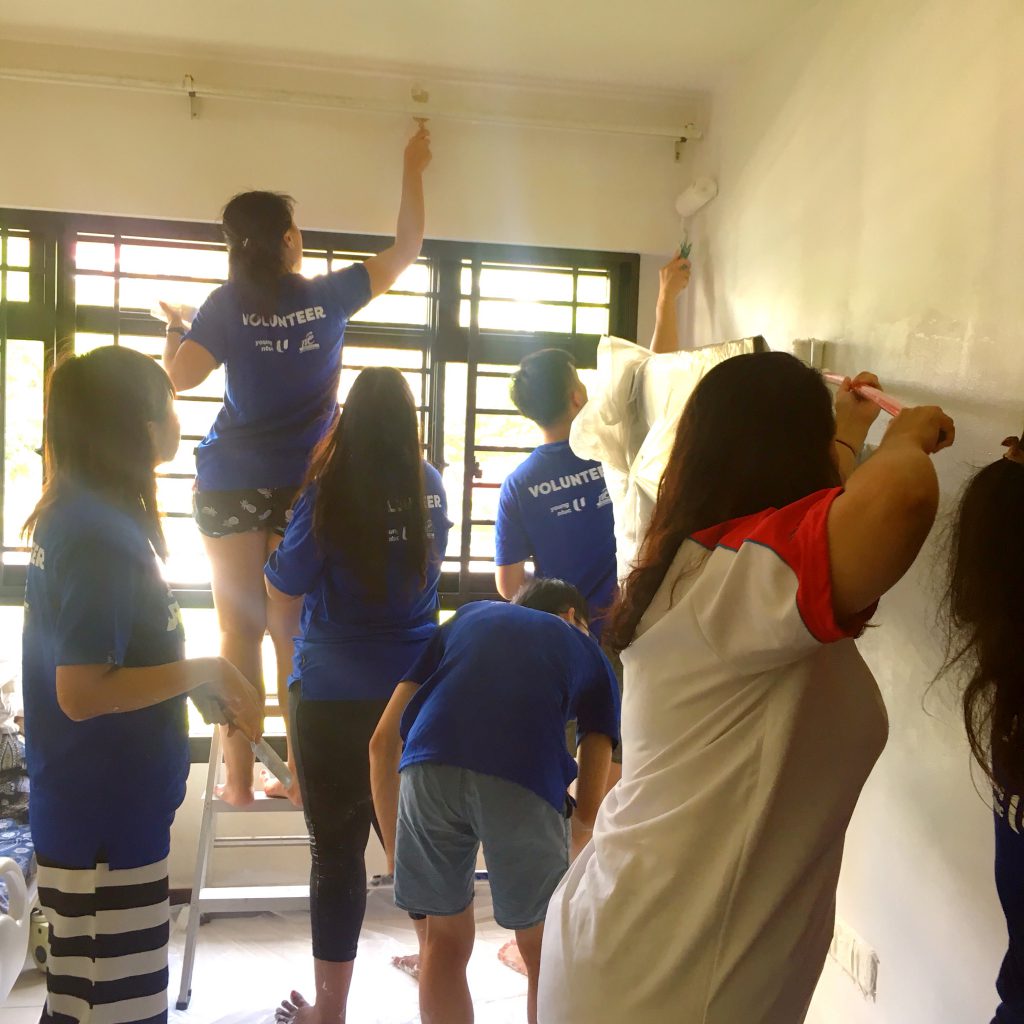
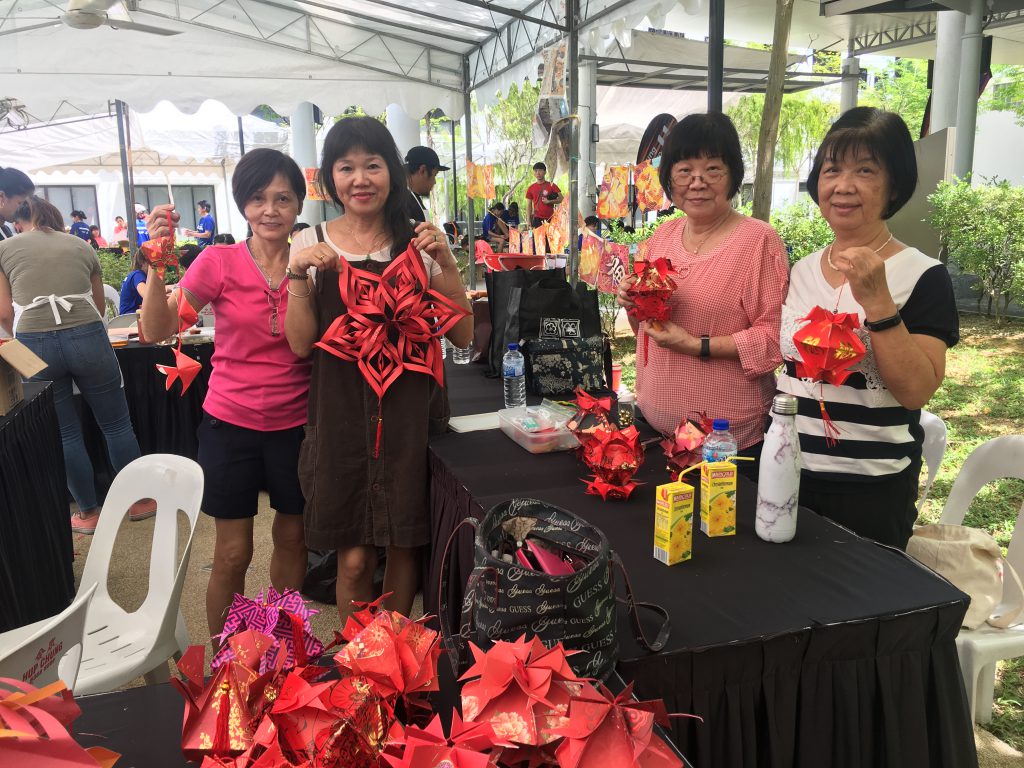
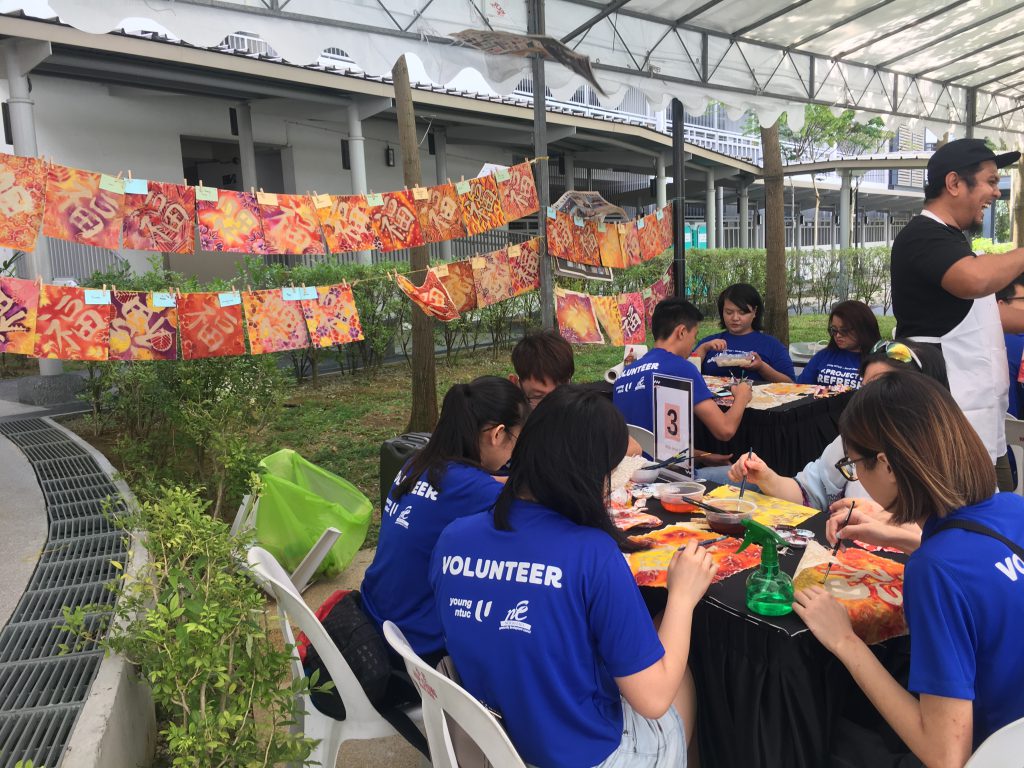
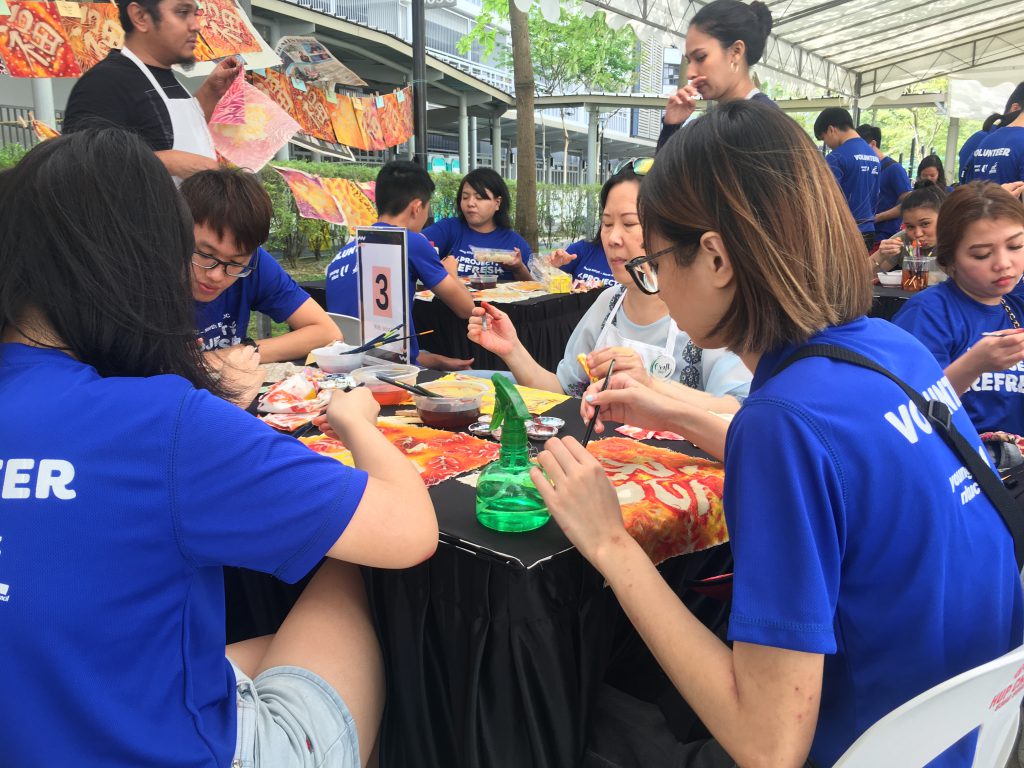
A Reunion Under Lanterns
Molly’s lanterns were later hung at the entrance of Mdm Celeste’s home. The 69-year-old retiree said as she looked up at the lanterns, “I don’t usually put these up,” as she shared about the several falls she has had, and how her bad knee prevents her from taking on any chores that require her to climb or lift heavy loads. Which was why she was especially grateful when a group of bustling volunteers came by to clean her windows, change her curtains, and decorate her home. All of those she had been wanting to do, but are too physically strenuous for her.
“Talking to people feels very ‘shiok’ you know?”
Beyond lending their helping hand, the company of the Project Refresh volunteers were also a significant part of the project to some of the senior residents, and vice versa. “We came here expecting a lot of clutter and many things to do, but her home is actually quite organised already. I think it’s the company that she really misses,” said 29-year-old Zaki. He volunteered expecting a physically taxing morning, but found himself enjoying the conversations with his 67-year-old resident, Madam Mariam. As the secondary school volunteers moved her carpet and mopped the floor, Madam Mariam spoke heartily about her younger days when she ran a food stall. Her sprightly movements left no hint that she had suffered a stroke just two years ago.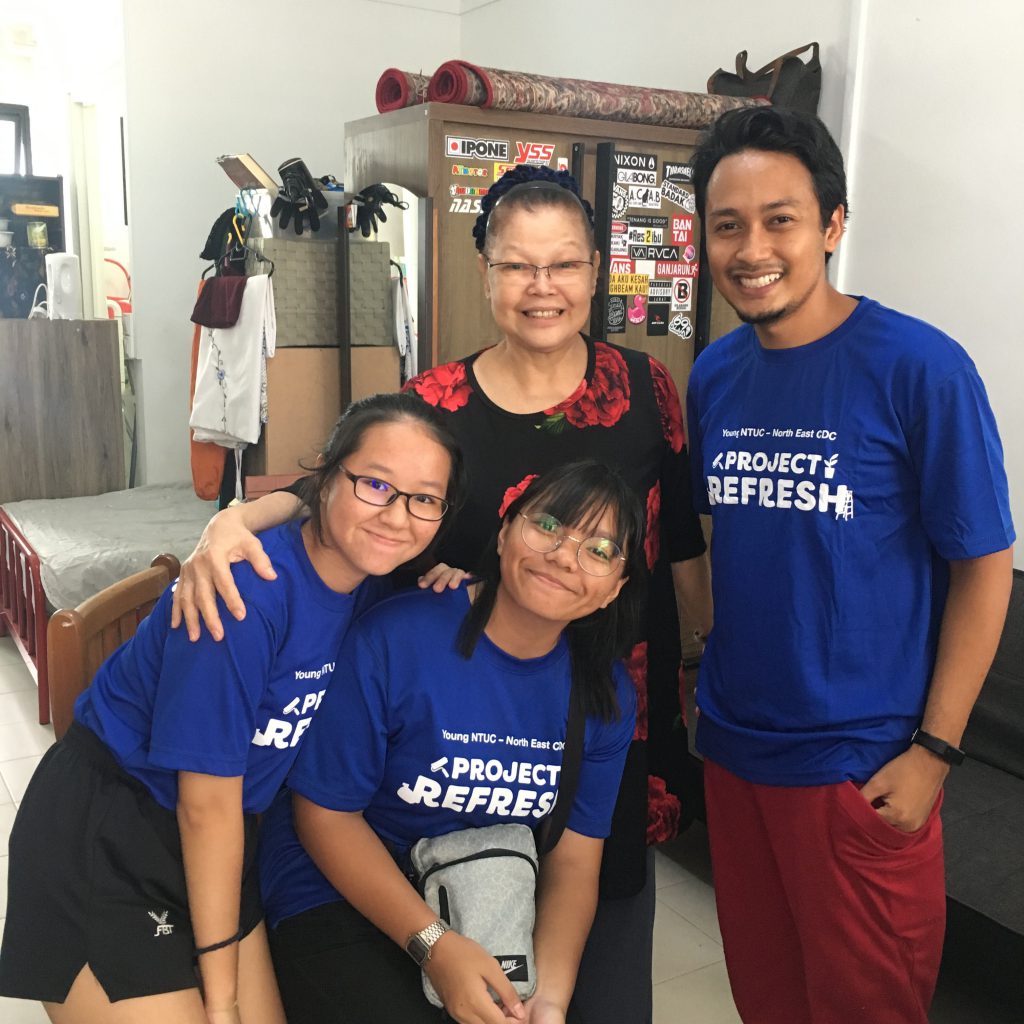
Picking Something Up From The Senior Residents
While the project was directed at giving support to the senior residents, some of the volunteers also found themselves taking away something from the residents they helped. “I have only painted once in my life, for my own house. But it’s patchy,” said Gan, a lecturer and first-time volunteer at Project Refresh. Looking at the patchy paintwork he did for his resident, Abdul Malik’s house walls, he added sheepishly, “just like that.” Little did he know, 64-year-old Malik was actually an apartment painter himself, but has had his movements limited ever since he got a stroke just a few years before. And soon enough, Malik became a painting teacher to Gan and the other volunteers in his home. As he muttered ‘aiyo’s and ‘aiya’s at the inexperienced painters (volunteers) getting paint on their own clothes and even faces, he patiently guided them with technical tips like painting with ‘W’ shaped strokes. “They might not know how to paint properly, but they have the heart. It’s very heartwarming knowing that they can use their morning for anything else but they chose to come here to help. They are very willing to learn also,” said Malik.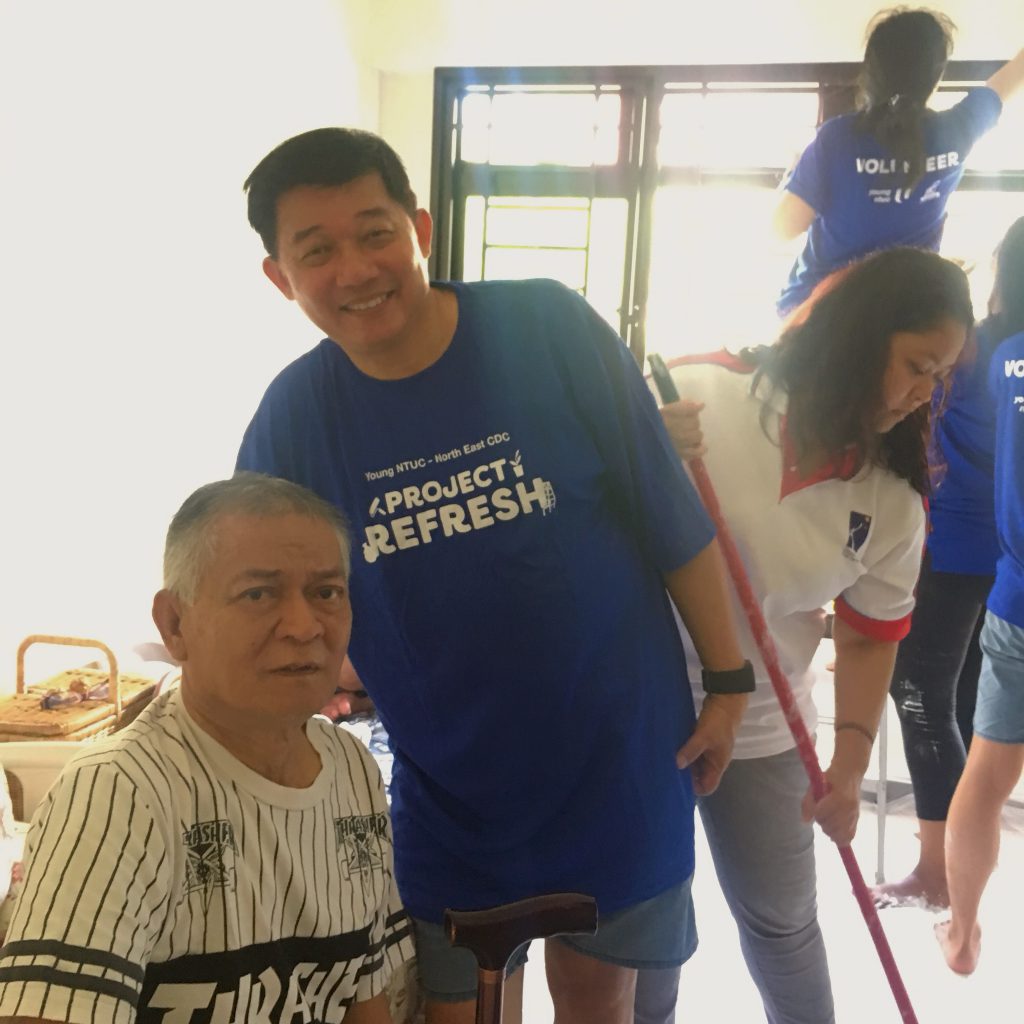
Filling Homes With Warmth
By the end of the day, 96 households received the Project Refresh treatment. In action, the volunteers are there to declutter, clean, paint, and decorate. However, the significance of them there is more than just the physical help. For these senior residents living in isolation, the commotion and presence of volunteers are rare occasions that fills their home with conversations and laughter that they otherwise lack. And for these residents, it was also a perfect start to their Chinese New Year. “They make my house feel like a home,” said Madam Mariam. This article is contributed by Young NTUC. Also read: 65-Year-Old Mdm Rebecca’s Life: A Look At The Reality Of Singapore’s Privilege Gap.Attributing her strength to her religion, Mdm Rebecca emphasised on how a positive mindset helped tide her through the hardships. “Life is temporary and all these challenges are part of life. I don’t cry easily because crying doesn’t change anything. I just do my best with what I have and I pray for the best.” As I chatted with Mdm Rebecca at her doorstep while volunteers from the Young NTUC- North East CDC Project Refresh were cleaning up her unit and giving the walls a fresh coat of paint, I couldn’t help but admire her for her resilience.“My mother had already suffered. I don’t want my cousin to go through the pain of what my mother had to go through.”
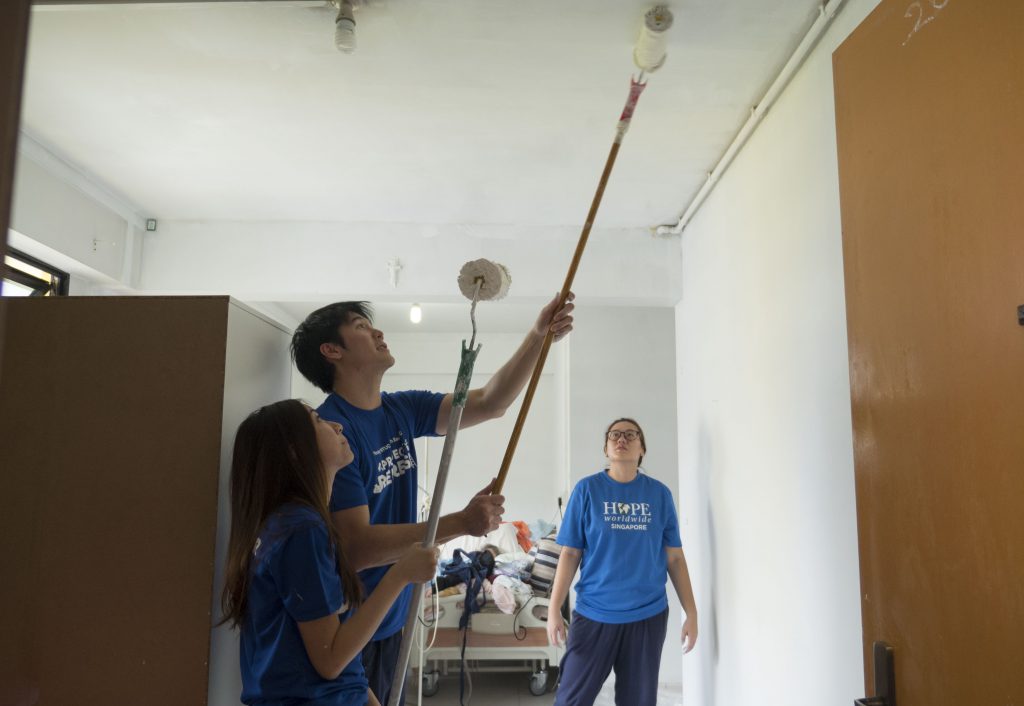
Her fizzy, greyed hair and gaunt face tells of a woman who is still facing adversity, but Mdm Rebecca’s strong spirit is refreshing and humbling. She spoke about helping neighbours in need and counselling her friends and their children. Her empathy in prioritising other people’s problems above so many of her own made me feel a mix of guilt and respect.
Having come from a relatively privileged middle-class background, I couldn't comprehend the significance of her struggles until I stepped into her home. Mdm Rebecca’s home is about as big as a typical HDB flat’s living room, with a small corner as kitchen and a toilet right beside it. The only bed in the flat is taken up by her cousin.